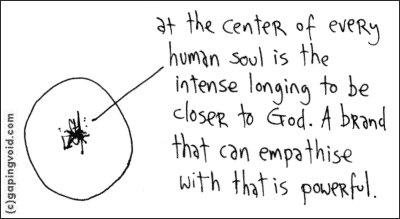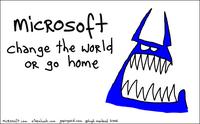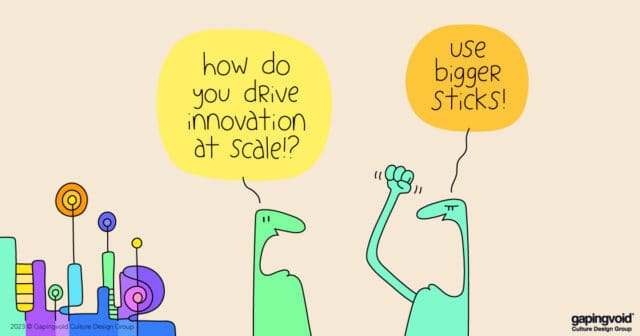
(Cartoon taken from The Hughtrain etc.)
Like I said in my interview with Mark Earls, The Blue Monster is a “Purpose-Idea”. As Mark, the man who first coined the term explains it:
Put really simply, the Purpose-Idea is the “What For?” of a business, or any kind of community. What exists to change (or protect) in the world, why employees get out of bed in the morning, what difference the business seeks to make on behalf of customers and employees and everyone else? BTW this is not “mission, vision, values” territory – it’s about real drives, passions and beliefs. The stuff that men in suits tend to get embarrassed about because it’s personal. But it’s the stuff that makes the difference between success and failure, because this kind of stuff brings folk together in all aspects of human life.
Real drives, passions and beliefs. Exactly.
The Blue Monster line, “Change The World Or Go Home” is not rocket science or literary brilliance. It just articulates a simple belief, a simple passion, a simple drive THAT ALREADY EXISTED, long before The Blue Monster ever came on to the scene. That’s all it was ever meant to do.

[The Microsoft Blue Monster etc.]
Whether you agree or disagree with it doesn’t matter, the important bit is that people within Microsoft believe it. Unlike a conventional ad campaign, it’s not about you. It’s about them.
Why is something like this potentially valuable to a business? Simply put, if you believe something passionately enough, for long enough, articulate it well enough, and your actions are aligned, credible and consistent with your belief for long enough, it’s just a matter of time before other people start believing it, too. And next thing you know, you have an interesting conversation going on, both inside and outside the company. And as Doc Searls famously said, “Markets are conversations”. Ker-Chiing.
Again, none of this is rocket science. Talking to people never is.
When people ask me what exactly is a Blue Monster, I tell them, it’s not necessarily a cartoon. It’s simply a social object that allows one to more easily articulate the Purpose-Idea. No more, no less.
I’ve been asking myself for years, what comes after conventional, Madison-Avenue-style advertising, now that we live in a post-TV, post-advertising, post-message world? “Creating Blue Monsters” is the closest I’ve ever come to finding an actual answer.
Besides drawing the cartoons, helping other companies create Blue Monsters is how I intend to spend the remainder of my career.
Cartoons and Blue Monsters. I really do have the world’s greatest job. Rock on.



